Off The Bookshelf: Charlie and the Chocolate Factory
So I wanted to start a section of my blog focusing on sources of inspiration, that is, what inspires me as a writer and what I hope can inspire others as artists. The first idea that came to mind was a subtopic for the books I’ve read that have motivated me in my writing, sort of like a virtual bookshelf. Then I thought, what better book to start off with than the one that first inspired me to become a writer? So here is a brief review of one of my favorite books as a child: Charlie and the Chocolate Factory by Roald Dahl.
Summary
In case you haven’t yet read the book (first published in 1964) or seen either of the movie adaptations (released in 1971 and 2005), Charlie and the Chocolate Factory tells the story of Charlie Bucket, a kind and honest young boy of very humble origins who has always been intrigued by the mysterious chocolate factory located near his home, run by the legendary Willy Wonka. One day, Charlie’s wildest dreams come true when he becomes one of only five lucky children around the world to find a golden ticket inside a Wonka’s chocolate bar, constituting an invitation from the famous chocolatier himself to visit his factory for an entire day. Fantastical adventures ensue as Charlie and the others follow Mr. Wonka on a magical tour through the strange facility, at the end of which lies a special grand prize for only one very lucky child. How will things fare for our hero and the four terrible brats as they discover the wonders of Wonka’s chocolate factory? It’s the greatest adventure of young Charlie’s life, and he can’t wait to find out!
Review
I first read this book when I was nine years old, at the recommendation of my mother. Though I was no stranger to reading, it was the first book I ever read that was written by Roald Dahl, and consequently, it became the reason he was my favorite author growing up. Charlie and the Chocolate Factory fulfilled a great wish I had throughout my entire childhood: to escape into a magical world far from the realm of reality.
As I read the story, I lived vicariously through the character of Charlie Bucket, who had the amazing opportunity to step out of his ordinary life and spend a day in a land of fantasy. Today, I look at him as an excellent role model for young children: humble, honest and with a vivid imagination. Willy Wonka is a wonderfully eccentric character, likely intended as a personification of the dreamer mentality lost on many of the “normal” adults in the author’s stories; and the four children joining Charlie on his adventure have such ridiculously bratty personalities that it can only make for some hilarious scenarios during the course of the factory tour.
But it wasn’t just the story that I loved; it was the way it was told. Mr. Dahl always had a very creative style of narrating his children’s books that appealed as much to his young target audience as to the metaphorical child in each of his older readers, and Charlie and the Chocolate Factory is no exception. Every time one of the bratty golden ticket winners gets into trouble, the situation is resolved in a unique and comical way as could only come from a mind as imaginative as Dahl’s. The songs sung by the factory’s Oompa Loompa workers are not only funny, but actually teach valuable lessons, though it’s safe to assume the advantages of reading over watching television and the prominent role that parents play in raising spoiled children are already common knowledge. Even the various candies and chocolate delights described throughout the story sound so delicious and inventive, you wish you could reach into the pages and try some for yourself (except maybe the chewing gum).
Inspiration
Though I was already a longtime fan of fiction, this was the first book to make me want to write stories of my own. The joy I felt when escaping into Charlie’s world inspired me to follow Mr. Dahl’s lead and create magical adventures for others to enjoy, and for that, I will always admire him as one of my all-time favorite authors. With its wild twists, eccentric characters and endless supply of phizz-whizzing fun, Charlie and the Chocolate Factory is a great read for the imaginative child in any reader, and especially for the dreamer in every fiction writer. One could expect nothing less from the world’s most scrumdiddlyumptious storyteller!
Five Things I Wish I’d Known About Writing a Book When I Was a Kid
I fell in love with creative writing when I was in the fourth grade, after spending many childhood years reading books and discovering the fun of narrative composition assignments in school. At the age of ten, I decided that writing was something I wanted to do for the rest of my life, and publishing a book was one of those goals I absolutely had to accomplish at least once before I died. Eager to get a headstart on my career as an author, I wasted no time in writing my first novel. As it turned out, however, being a preteen writer came with a major disadvantage: a severe lack of experience.

The vintage typewriter of my life: this is the classic iMac on which my very first novel was written.
The final product of my labor was a relatively short tale about a child’s adventure through a dream world, creating imaginary friends along the way to aid her on her quest to develop what she had been missing for years: an active imagination. Though I believed the idea to be a good one, I realized a few years after finishing the story that the execution was subpar due to various mistakes that I hadn’t recognized when I was ten. Of course, I don’t want to bore you with the details of every single one, so instead, here’s a list of five of the most important aspects of fiction writing that I wish I had known when I was working on my first book.
1) Good books don’t get written in a day.
Unless you’re an extremely focused hermit locked in a room with nothing but a desk and a typewriter (or you’re the Flash), you’re not turning out a bestselling novel in less than 24 hours. Now, I didn’t literally expect to write a whole book in one day, but given that the basic outline of a plot was already clear in my mind when I started, I also didn’t expect it to take longer than a week to finish. Instead, I probably spent the equivalent of at least a month’s worth of writing before I finally completed my novel. By creating such unrealistic expectations, I was setting myself up for the disappointment that inevitably hit me after the first week of writing came and went. And disappointment is not an emotion that ten-year-olds are usually prepared to handle well…
It’s worth mentioning, however, that I probably still could have finished my story in less time than it actually took me. So why didn’t I? Because there was one piece of advice I didn’t take into account before I started…
2) Planning is important.
I made the rookie mistake of thinking that a single idea was all I needed before I actually started writing a novel. I thought that as long as I could keep that one idea clear in my head, inspiration would take over and I’d have a full manuscript ready before I knew it. Unfortunately, as I quickly discovered, novels don’t quite work that way. There were several instances during the writing process when I had to stop and even retrace my steps because I wasn’t entirely sure how to move the action forward, or how to fill a gap between two scenes that I already knew were going to happen. I’m not saying I should have spent a year only planning without actually writing anything, but had I taken just a little more time to map out the full course of my story before I dove headfirst into the narrative, I could have saved myself a lot of confusion and tedious rewrites in the long run.
3) Compelling characters are those who are flawed.
During the course of my story, my protagonist created three imaginary friends, each of whom was some sort of fantasy creature with magical abilities of incredible power. Ironically, the only imperfection in each of these characters was the fact that they were perfect. They were all beautiful, intelligent, strong, courageous, and downright wonderful in every way conceivable. In retrospect, they were probably the personifications of the qualities I subconsciously wished or wanted to believe I had myself, with none of the drawbacks.
But there was a major problem with this: my characters were not relatable. Perfection was fine for my own daydreams, but nobody wants to read about impossibly powerful heroes who can save the day without so much as breaking a sweat (outside of comic books, that is). Readers want heroes who make mistakes, who fight for their goals with everything they’ve got and emerge triumphant after struggles that only made them stronger in the end. In other words, readers want to potentially see themselves in their heroes. And my characters didn’t fulfill that purpose. By designing them to be impossibly perfect, I had inadvertently made them every writer’s worst nightmare: boring.
4) Bad things must happen to good people.
Yes, I was one of those idealistic children raised on fairy tales, who believed that good always triumphed over evil, and the heroes should always defeat the villains in every battle, with no exceptions. This was reflected in the climax of my novel: when I finally introduced actual antagonists near the end of the story (another mistake, mind you), a series of fights ensued in which my main characters would always beat the bad guys every time they tried to attack. In the end, the villains were completely defeated, while the heroes were left without even a scratch. As you can imagine, that was a pretty boring scene.
This was probably the biggest flaw of my story: I had failed to create suspense. With every single attack of every single fight ending in the heroes’ favor, the scene that should have been the most exciting part of my novel became too predictable and bland. If, however, I had thrown a few twists into the mix, such as having one of my protagonists suffer a terrible injury that put her at the villains’ mercy, I could have set the scene up for a much more engaging and satisfying conclusion. In short, if anyone was going to care about whether my good guys would win the war, there had to be at least a chance that the bad guys might win a few battles first.
5) Your first book is going to stink… no matter what.
OK, maybe this isn’t true for all writers, but it’s likely true for most (if you’re one of the exceptions, I salute you). Sometimes I think that even if I had known everything else about planning and character development and conflict, my first novel still would have turned out mediocre at best. I was, after all, only ten years old; how well could I really have written a story reflecting important values of life if I had barely even started living mine? But even if I had started my first book in my twenties, I’m sure it still wouldn’t have amounted to a great classic of literature, because to know what to do in order to turn out a brilliant piece of fiction, I first would have had to know what not to do, and there’s only one truly effective way to learn that lesson…
I have absolutely no regrets about my first attempt at writing a novel. Although it was rather lame, I still love it for everything it’s taught me about fiction writing, and the fact that I was able to start gaining this experience at such a young age makes me all the more optimistic about my future as a writer. Today, I’m proud to say that I am once again working on a novel, this time with naturally flawed characters and a storyline filled with due drama and suspense, all planned out well in advance. From here on, there’s only room for improvement.
So what about you? If you’re a writer, have you been through a similar experience? What did you learn from your first mistakes in fiction writing?
How Much Love is Too Much?
No, I don’t actually believe in such a concept as “too much love”. If anything, the world could always use more love. But I’m not talking about world issues right now; I’m talking about romantic fiction.
Today’s topic is about the dangers of overusing the phrase “I love you” when writing romance. Now you might be wondering what exactly gives me the credibility to write about such a topic, and the answer is… not very much, except for my own amateur experience writing cheesy romance as a teenager and reading it again years later as an adult. So I’m just gonna talk about that.
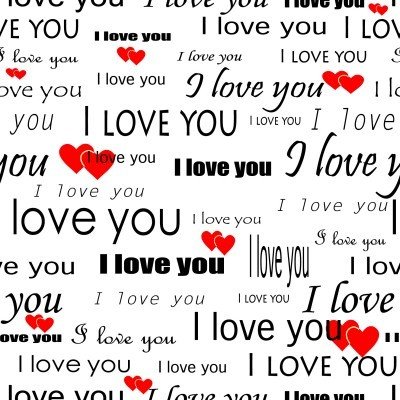 When I was 16, I was a hopeless romantic. Now that I’m in my twenties… I’m still a hopeless romantic, but with a little more wisdom. As I’ve mentioned before, I spent part of my teen years writing medieval fantasy stories, among which was a star-crossed love story between a paladin (light-magic knight) and a necromancer (dark-magic sorceress). This story, so I had hoped, would someday develop into my first published novel. I was rather proud of it at the time I was working on it, even going as far as to share an excerpt of a particularly romantic chapter with friends. However, because my studies were highest on my list of priorities, the story was never finished, instead sitting in my computer as an incomplete novella collecting metaphorical dust over the course of a few years. It was after I started college that I finally rediscovered the piece among my archives, and after rereading my work with a fresh perspective, I finally began to take notice of some elements in the narrative that were – to my disappointment as a perfectionist but my delight as a neophyte at writing – dangerously clichéd.
When I was 16, I was a hopeless romantic. Now that I’m in my twenties… I’m still a hopeless romantic, but with a little more wisdom. As I’ve mentioned before, I spent part of my teen years writing medieval fantasy stories, among which was a star-crossed love story between a paladin (light-magic knight) and a necromancer (dark-magic sorceress). This story, so I had hoped, would someday develop into my first published novel. I was rather proud of it at the time I was working on it, even going as far as to share an excerpt of a particularly romantic chapter with friends. However, because my studies were highest on my list of priorities, the story was never finished, instead sitting in my computer as an incomplete novella collecting metaphorical dust over the course of a few years. It was after I started college that I finally rediscovered the piece among my archives, and after rereading my work with a fresh perspective, I finally began to take notice of some elements in the narrative that were – to my disappointment as a perfectionist but my delight as a neophyte at writing – dangerously clichéd.
Now, I won’t be going into excruciating detail about what made my unfinished story trite; I wouldn’t want to bore you with what could easily be thousands of words’ worth of self-criticism. Instead, I want to cover the main cliché in my work that jumped out at me the most: the aforementioned overuse of the phrase “I love you”. At the end of every romantic scene between the main characters, I would have them finish their conversation with those three words before they parted ways. It made sense to me that those should always be the last words they’d hear each other say until the next time they met. So what was wrong with that?
What I didn’t yet realize at the naïve age of 16 was that by having my characters actually say the words “I love you”, contrary to my intentions, I was creating less-than-believable dialogue. I was writing based on an instinct I’ve had my entire life: to always make sure these are among the last words I say to my loved ones before we leave each other’s company. Although this was perfectly normal for me (or perhaps because it was), it took me a while to realize that such a practice is not universally routine. Not everyone is accustomed to speaking the phrase several times in a single day; for many, it’s often just implied, if even that.
This, I realize now, is what I should have made clear with my characters. The love between them should have been implied, without the need for constant spoken confessions. By having them end every conversation with “I love you”, I was inadvertently detracting from the emotion that should have already been established outside of the dialogue: the way they looked at each other, the subtle gestures they exchanged, the littlest details of every kiss. This surely would have made their romantic moments much more believable, and more importantly, it likely would have made the moments that I did have them confess their love verbally all the more powerful. And isn’t that really the ultimate goal of writing romance in the first place?
Though I never did finish this particular love story, I don’t consider a single second spent writing it a waste of time. Leaving it untouched for a while helped me to see it again with the slightly wiser mindset of a young adult, and recognizing my own mistakes taught me about a part of my growth as a writer and a person that I might not have come to notice otherwise. But you don’t need to care about how this subject has affected me; what’s important for you to take away from this topic is a new awareness of how to recognize believable dialogue in romantic scenarios, especially if you plan on writing some yourself.
So if you appreciate romance as much as I do, please feel free to take my advice and learn from my mistakes (or even yours, if you’ve been through a similar experience). In short, writers should take care not to abuse the words “I love you”; if you wouldn’t do so yourself in your real life, you shouldn’t have your characters do so in your fictional works. “I love you” is a beautiful and magical phrase, but it can only remain so as long as it’s handled with the respect it deserves. Please write wisely; true romance enthusiasts everywhere thank you.
TV Tropes, a.k.a. The Greatest Website That Will Ruin Your Life
Do you ever find yourself reading a book or watching a movie and noticing certain elements in the story that you’re sure you’ve seen before in the plots of other works of fiction? Or better still, do you ever find yourself talking about stories from these media and mentioning said elements in the form of a question that starts with, “You know that thing where…”?
Chances are there’s a trope for that.
What is a trope, you ask? Well, it’s not entirely easy to explain, as the definitions may vary slightly based on opinion. The simple definition is that tropes in fiction are devices that have become common enough throughout their respective media to have established themselves as conventions in the minds of the audience, and thus are reliable to writers as useful tools in creating fiction. A slightly more complex definition expands on this simpler one to also include examples of such conventions in real life, as in behind the scenes or even real-world events. Of course, a much more thorough explanation can be found on the website’s homepage itself, so instead of launching into a long and tedious description of TV Tropes and its endless supply of examples, I’ll simply provide a brief account of my own experience with the site and leave the option of following the link provided to your own discretion.
One of my first visits to this site was when I was looking up information about a certain Disney movie (I want to say it was Tangled, but my memory fails me). What I found was an abundance of tropes used throughout the film that could be easily recognized as conventions present in the plots of other stories (Character Development, Non-Human Sidekick, Happily Ever After, etc.). I was so intrigued by this new resource I had discovered that it wasn’t long before I started referring to it for examples of tropes in other fiction works – films, TV series, literature – learning more about these devices with each page I opened.
So why would I say this site will ruin your life? Because there’s a very good chance that at least once (and probably on your first visit), you’ll fall into the same trap I did: the web of tropes. On virtually every TV Tropes page, there will be a link that catches your eye, leading you to another page with more interesting information and new links, which in turn lead you to other pages with their own intriguing links… until the next thing you know, it’s an hour later and you can’t remember which page you originally meant to read without checking your browser tabs or history for a reminder. How did that happen?
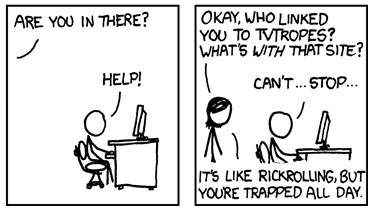
In case you need a visual aid, my experience with TV Tropes (and that of countless others) can be summed up in this webcomic. (Courtesy of xkcd)
Here’s an example of one of my typical TV Tropes sessions: I start by opening the page of a classic Disney film, let’s say Beauty and the Beast. One of the listed tropes is the famous True Love’s Kiss, complete with a brief explanation of how the instance in this particular movie is more of a variation than a straight example, which sparks my curiosity to read about other examples in different works. A moment later, I’m reading this trope’s description on its own page when… Wait, what in the world is a Dead Unicorn Trope? Obviously I go to that page to find out, only to realize in two seconds that I’ll first need to know what a Dead Horse Trope is in order to understand the unicorn variation, but this one interestingly turns out to be a common cause of a phenomenon known as Seinfeld is Unfunny… Several pot holes later, I’m back at the True Love’s Kiss page reading about how it’s a subcategory of a greater trope known as the Magic Kiss, leading me into another chain of links through the site. After another half hour, I go back to reading the list of tropes in Beauty and the Beast, where I soon find another trope that intrigues me, and the whole thing starts all over again.
But you know what? I love every minute of it, because even if I know TV Tropes will ruin my life on one hand, in a way, it also enhances my life on the other.
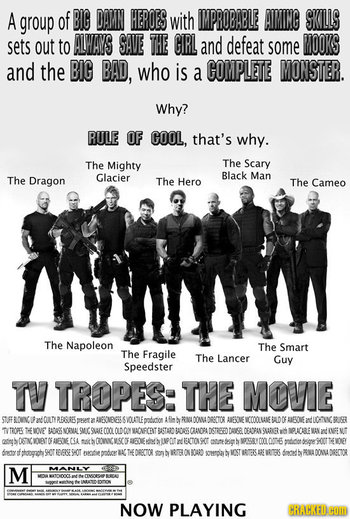
Now that’s what I call Troperiffic!
(Image by AgentCoop of Cracked.com)
TV Tropes is an excellent resource for anyone who appreciates works of fiction, and especially for writers of such works. Learning about the various devices used in media and how they function in their respective plots teaches us how to analyze fiction critically, allowing us to develop a keener understanding of the elements that make up a story. This is particularly important for writers, because we more than anyone else should have as thorough a knowledge as possible in the workings of the stories we wish to create. How can we expect to write good fiction if we don’t have a decent understanding of the myriad of tools at our disposal?
So yes, by pulling you into its vortex of interesting content, TV Tropes may easily ruin your life. But in the end, if you somehow emerge with a refined outlook and even a new respect for the fiction you already love, then wouldn’t you really just be exchanging it for a better life?
U is Not a Word: Improper Uses of Chat Speak
A college professor started his class one day by handing back the assignment his students had turned in a couple of weeks prior, now complete with his corrections. After returning the essays to their respective writers, he then made his way to the front board and proceeded to address the entire class.
“I hoped I wouldn’t have to do this…” he said disappointedly, and he turned to the board to write a single word-letter pair on it:
You/U
The professor turned back to the class and explained that the correct way to write the word “you” in a paper is Y-O-U, never just the letter U, as he had noticed in some of the essays now sitting on his students’ desks decorated with red ink. He then took the time to write a few more sets of words on the board:
Your/You’re
Their/There/They’re
To/Too/Two
Once again, the professor explained to the class the proper use of the words he had just written. The students nodded along as though they knew all this already, but the red ink lining their essays told a different story. If they really knew how to use these words correctly, why would they write about how “you are appreciation for music”, or how “their is an exponentially growing number of bands today in comparison to the past decades”, as if the verb in that phrase belonged to somebody? His explanation finished, the professor returned to his desk to start the day’s lesson, clearly deeply saddened yet again by the increasing decay of the once beautiful structure of the English language.
I wish I could say I fabricated this entire story. I really do wish it were a product of my own imagination, to make up such a scene as college students tossing incorrect grammar around their essays as haphazardly as a child sprinkling sugar over their breakfast cereal. Unfortunately, I regret to say that this story really happened. Well, the basic event, anyway; I took the creative liberties of a writer who wasn’t actually there to fill in a few blanks. This story was recounted to me by my best friend, who had a (metaphorical) front row seat to the rebuking of his classmates for “butchering the English language”.
To be honest, I wasn’t surprised to hear about the homonym-related spelling mistakes. That’s a common problem that I’ve been seeing since I was in grade school, and though I’d be lying if I said it didn’t bother me, I can’t be too fanatic about fixing it either, so I won’t even focus on that. We all make mistakes; even I’ve caught a fair share of “your’s” in my writing that should have been “you’re” (I certainly wasn’t trying to state that the “welcome” belonged to the person with whom I was chatting). What did shock me was learning that the students in the above story had been trying to pass off the letter U as a word all by itself… in a college essay. I’ve known for a while that traditional grammar is on a decline, but I had no idea it had gotten this bad, at least not yet…
A Bad Influence?
 Let me take this moment to say that I am not a so-called “grammar nazi”. I don’t prowl around message boards and comment threads pointing out the technical mistakes in people’s writing that don’t even detract from the content of their posts. I get that there’s a whole other written language for the Internet, the so-called “textese” consisting of abbreviated words and a bare minimum of capital letters that people are trained to understand through extensive use of chat programs and SMS, and that’s fine. The problem is when this language spills over into the “real world”. Abbreviations like “U”, “plz” and “thx” don’t belong outside of text messages and chat conversations, and they especially don’t belong in college assignments.
Let me take this moment to say that I am not a so-called “grammar nazi”. I don’t prowl around message boards and comment threads pointing out the technical mistakes in people’s writing that don’t even detract from the content of their posts. I get that there’s a whole other written language for the Internet, the so-called “textese” consisting of abbreviated words and a bare minimum of capital letters that people are trained to understand through extensive use of chat programs and SMS, and that’s fine. The problem is when this language spills over into the “real world”. Abbreviations like “U”, “plz” and “thx” don’t belong outside of text messages and chat conversations, and they especially don’t belong in college assignments.
Now I beg your pardon while I get this one rant out of my system: U is not a word! Not counting official abbreviations, the only real single-letter words in English are A (article) and I (pronoun). When writing in the second person, the correct spelling is Y-O-U. “You should know that U is the 21st letter of the alphabet, and should be treated as such.” That’s the proper way to write. So please, leave your U’s and plzes and thxes online and in your cell phones where they belong, and make an effort to write correctly everywhere else. The English language thanks you.
OK, now that that’s out of the way, time to end on a lighter note…
Don’t Worry, Your Phone is Still Your Friend
Atrocious effects on formal writing aside, did you know that texting actually has its benefits too? I’m not talking about the obvious convenience of sending a message to friends in a second’s notice, but about the ways texting helps to exercise the mind. I know; I was surprised when I first heard this too. But that can’t be right… can it?
- Brevity = brilliance. Means of communication like SMS often come with a character limit, which means long messages need to be written as concisely as possible while still being comprehensible, and that usually takes some clever thinking.
- Breeding a new generation of writers. Texting gives young people more motivation to write; most teenagers today probably wouldn’t bother writing at all without the stimulation of conversation provided by email and texting.
- A different form of spelling practice. Most surprisingly, the practice of abbreviating common words has actually been shown to improve students’ literacy and spelling!
So clearly, chat speak is not as bad as it’s made out to be by many advocates for the English language today. Who knew?
Why am I mentioning this? Partly as a curiosity, but mostly so any major fans of texting reading this won’t think I’m an ignorant monster for bashing one of their favorite pastimes. I just want to clarify that I’m not attacking texting itself; I’m simply defending the practice of organizing different forms of spelling into their appropriate media. In short, U is an understandable and sometimes acceptable abbreviation, but it is not a word. Write wisely!
Oh, and one last thing: no matter how beneficial texting may be for your mind, never text and drive! Just thought I’d point out what should be common sense…
Thanks for reading! And remember: always treat language with respect. Happy writing!
Writer’s Toolkit: What If? Writing Exercises for Fiction Writers
Every writer who is serious about their craft needs to have a well-stocked writing toolkit at their disposal. Of course, the exact tools may vary among the different artists who choose to use them: a poet may use only small notebooks for jotting down his thoughts, while a short story writer may also choose to keep index cards for organizing her ideas, while a novelist may have a whole bulletin board (or even a room full of them) for keeping track of elaborate plots. Some tools can be seen as universal necessities to all creative writers (such as journals and the aforementioned notebooks), and others seem to be more of a personal preference (such as index cards and exercise books).
In the interest of exploring this array of choices, I’ll be telling about my experience with the instruments in my own writer’s toolkit, starting with a fantastic book of fiction exercises that has proven to be a valuable asset to me: What If? Writing Exercises for Fiction Writers, by Anne Bernays and Pamela Painter.
About the Book
I bought this book for the online creative writing class I took through UC Berkeley back in 2011. The copy I own is the third edition, also called the college edition, which was released in 2009. It holds 109 exercises covering 13 different topics, plus 11 short short stories and 14 short stories provided at the end of the book. Also included with every exercise description is an explanation of the objective behind it, as well as the occasional example courtesy of the authors’ students.
The topics (or parts) covered in the book are:
- Beginnings;
- Characterization;
- Point of View, Perspective, Distance;
- Dialogue;
- The Interior Landscape of Your Characters;
- Plot;
- The Elements of Style;
- A Writer’s Toolbox;
- Invention and a Bit of Inspiration;
- Revision: Rewriting is Writing;
- Sudden, Flash, Micro, Nano: Writing the Short Short Story;
- Learning from the Greats; and
- Notebooks, Journals, and Memory.
So what can I tell you about the book? Here are a few key points I’ve learned from my experience.
Pros
The diversity of topics in the book allows you to “custom improve” your writing in the areas you feel need the most work. The explanations are easy to understand, and the student examples are excellent models of the techniques taught through the exercises. For a truly well-rounded experience, a friendly introduction by Bernays and Painter encourages all readers to explore the potential of their writer’s voice and explains the separate definitions of writing like a writer and thinking like one, while the last two sections provide 25 excellent stories to better illustrate the points made throughout the book. Needless to say (oops, Exercise 51: “Word Packages are Not Gifts”),What If? covers a wide enough spread to make it an excellent resource for any fiction writer, as much for the beginner in need of good practice as for the seasoned writer looking to rekindle the fire of inspiration.
But nothing is perfect, right? Now for the downsides…
Cons
The main obvious drawback about using What If? is that it practically requires sharing of completed exercises and subsequent receiving of critique in order for its readers to get the full intended benefits of the book, making it a more popular choice for creative writing workshops and courses as opposed to individual study. Aside from this, readers might find a couple of topics to be lacking in sufficient exercises (Part Seven, for instance, only contains four), which might put off those hoping for a more diverse selection within a certain module. Also, not every written exercise comes with an example, leaving it solely up to the practicing writer to determine the intended approach to the exercise. This is fine for the more independent readers, but for those often looking for extra guidance (like me), it might prove to be a bit of a disappointment.
Still, I honestly don’t think these minor cons do much to outweigh the stronger pros. Yes, What If? is not without its flaws, but overall, I feel it’s a worthwhile read that warrants a place on any writer’s bookshelf.
Summary
Pros
- Wide diversity of topics (13 total)
- Exercise descriptions that are easy to understand
- Excellent student examples
- Friendly and comprehensive introduction
- 25 short stories
Cons
- Requires feedback for full experience
- Limited selection of exercises in some topics
- Lack of examples in some exercises
Conclusion
Why have I chosen to open my Writer’s Toolkit posts with this book? It wasn’t a matter of random choice, but rather one of relevance to my own writing. Many of the pieces I’ve written (and others which I’m currently writing) blossomed from the exercises contained in this book, and because of the enlightenment and fun I’ve had with them so far, as well as my need for critique from other writers, I decided to make a habit of sharing some of my own examples of attempts to complete them.
So whenever a certain piece I share in the future has been inspired by a What If? exercise, I’ll be sure to provide a brief explanation of that exercise for easier reference. However, if you’re a writer and you don’t have this book, I highly recommend that if you have the time (and the funds), you grab yourself a copy of What If? as soon as you can! You won’t be disappointed.
There you have it: the top creative writing book on my shelf, and one of the most useful resources in my writer’s toolkit. I hope you’ll enjoy the pieces I produce from these exercises, and I also invite you as aspiring writers to try them out for yourselves. In fact, if you have writing blogs of your own, by all means, please share links to your own pieces in the comment sections. I would love to read them! In the meantime, please feel free to offer your feedback on my work; I look forward to receiving constructive opinions that would help me to further improve my writing.
Thanks for reading! Happy writing!

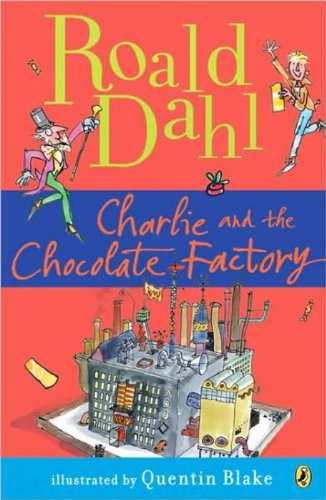

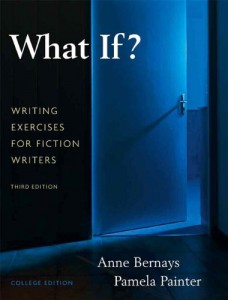

Recent Comments